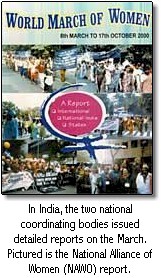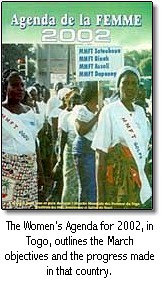"Women became more aware of the their role and involvement in society, especially regarding the struggle against poverty and all forms of violence. They understood that radical change cannot be accomplished without them," say the women of Gabon.

Many national coordinating bodies affirm that the March brought together groups that until then had been working in isolation. Groups in Nepal put aside political divisions to organize the demonstration marking March 8, 2000. In Barbados, groups "who previously would not have identified with the women's movement became actively involved with the issues of poverty and globalization."
Women in Australia say that the March "widened the circle of organizations and the ideas filtered down," even though much remains to be done with respect to rural women. In Angola, women believe "that the March served as a catalyst for a strong and unified movement of women from all sectors of society. It allowed many women's groups to unite in action regardless of political affiliation, religious beliefs or backgrounds."
"The March inspired popular and trade union women's groups to become more articulate. Women at the grass-roots level felt stronger in the knowledge that their local actions were part of a worldwide movement," says a member of the Brazilian coordinating body. The March also attracted many young Brazilian women who wanted to learn how to combat violence against women.
"Words like feminism and patriarchy can be spoken out loud now without generating the negative remarks we had been hearing in recent years," say women in Québec.
In some world regions, the March injected new vitality into the feminist movement. On September 30, 2000, some 4,000 women marched through driving rain in Rome, Italy. "It was something that hadn't been seen for years in the streets of Rome: three generations of women - Italians and immigrants, lesbians, women of various political stripes and diverging feminist tendencies - all united on this occasion," report Italian women.
Concrete gains
There were concrete gains. Some of them may be small, but when they are all added together they constitute a force for change.
In Peru, the March joined forces with the campaign for access to drugs to treat AIDS, malaria and tuberculosis so that "people are placed before the interests of powerful pharmaceutical companies."

The government of Nigeria responded favourably to the demand to assist women with low incomes.
In Togo, a "gender and professional training" module was set up in every technical and professional training centre; the first gynecological surgeon was assigned to the regional hospital in Atakpamé.
Many groups are fighting for legal reform. In Uganda, women are urging parliament to change the law so that the votes of its female members are given more serious consideration. Together with women in Burundi, Kenya and Tanzania they are fighting for debt cancellation for African countries. Finally, they are struggling for adoption of wife assault legislation and an equal opportunity (for women) law.
Women in India are calling on parliament to adopt the "Women's Reservation Bill," which aims to establish a minimum quota for women members of parliament.
In Turkey, the women's movement won a reform of the civil code so that women and men are equal within marriage. Angola's head of state suggested, in view of the slowness of the legislative process, that the government fund concrete projects to fight violence against women.
In Japan, legislation on wife assault and victims' protection, and child prostitution and pornography came into force in 2001. Changes were made to legislation requiring employers to take measures to prevent sexual harassment.
Despite the opposition of Catholic groups, in March 2001, the National Assembly of Panama adopted the Optional Protocol to the Convention on the Elimination of All Forms of Discrimination Against Women. The women's movement had devoted much time and energy to ensure passage of this legislation.






